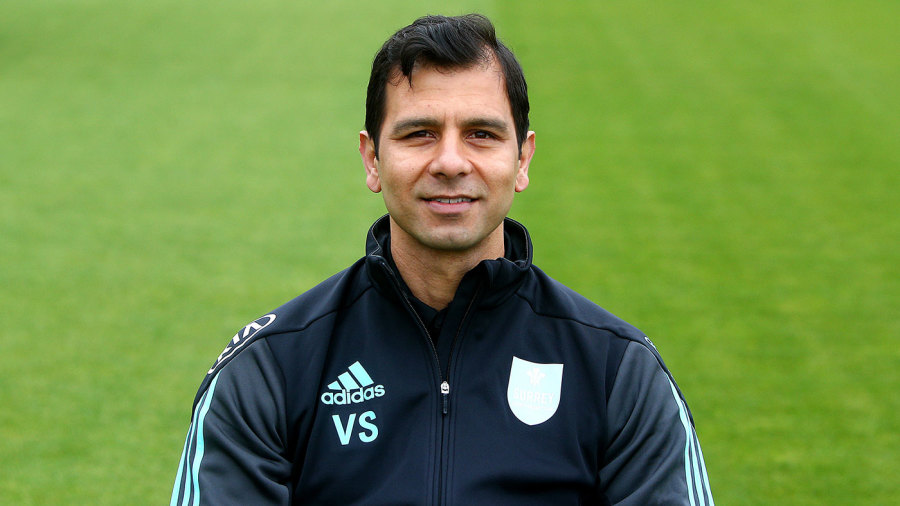 Vikram Solanki is currently on the coaching staff with Surrey © Getty Images
Vikram Solanki is currently on the coaching staff with Surrey © Getty Images
Wasim Khan, the chief executive of Leicestershire, has questioned whether the game in England and Wales can do more to encourage coaches and administrators from South Asian and Afro-Caribbean backgrounds.
While Wasim has welcomed the appointment of Vikram Solanki and Dimitri Mascarenhas as assistant head coaches at Surrey and Essex respectively, he raised the possibility of “unconscious bias” inhibiting the progress of more non-white coaches and suggested a concerted effort should be made to improve the situation.
His comments follow those of Roland Butcher, who recently described himself as “surprised” and “saddened” by the small number of coaching opportunities provided to non-white people despite there being “so many managerial positions available in the first-class game in England”. Butcher, the first man of Afro-Caribbean heritage to represent England at Test level, told the BBC “it appears as if Black and Asian coaches are not trusted to do a job”.
While the ECB has certainly made an increased effort to engage with the Asian community in recent times – Lord Patel of Bradford has joined the ECB board as an independent director and has been preparing a report on the issue, while Vikram Banerjee, the former Gloucestershire spinner, has been appointed as the ECB’s head of strategy – Wasim, at least, feels there is a great deal more to do.
“My concern is we’ve been talking about this for 20 years,” Wasim told ESPNcricinfo, “and we’re not seeing the progress we had anticipated. I think, as a game, we know we need to do better. We have started exploring the issue of unconscious bias. And that’s a welcome first step.
“I know the game has prided itself on the number of Asian players in the men’s side, but let’s now look beyond that: let’s look at what might be causing that blockage in the system and let’s see if we can provide more opportunities.
“You would have thought that having more coaches of South Asian heritage might prove helpful in reaching the players from those communities we are trying to attract into mainstream cricket. So let’s have an honest conversation now about what is stopping non-white coaches from taking the next step and graduating to those key positions at first-class counties. And let’s see if we can extend the fantastic progress made in the women’s game and try to involve more non-white players and coaches.”
Wasim’s words, while measured, are likely to have some impact. As well as having been the first British-born Muslim to play county cricket, he is also believed to be the only chief executive of BAME (black, Asian or minority ethnic) heritage at a professional sport’s club in the country and was recently named in the Muslim 100 Powerlist. He feels he owes his success to opportunities offered first by Mervyn King, the former governor of the Bank of England, who recommended him to the Cricket Foundation as CEO and then ECB president, Giles Clarke, who recommended him for the position of CEO at Leicestershire.
“I owe Mervyn and Giles greatly,” Wasim said. “They spotted some talent within me and helped me gain the opportunities to develop those skills. That’s the sort of belief I’d like to see shown in more people of BAME heritage.
“As things stand at present, some potentially really good coaches are telling me there’s ‘no point’ in them applying for such jobs as they don’t think the system will provide them with a fair chance. So let’s look into that. Let’s see if we can provide shadowing and mentoring opportunities with academy or head coaches and see if we can up-skill these guys so they are better prepared to seize opportunities in the future.
“Nobody is asking for tokenism. Meritocracy is vital. But let’s ask ourselves if we are really getting the best out of all the talent at our disposal at present and ensure there are opportunities for people of all backgrounds. Because if we don’t provide opportunities, we’ll never give benefit from all the available talent that is out there.”
Current figures suggest the percentage of cricketers of South Asian heritage on first-class staff – about 5% – roughly reflects the percentage of South Asian people in British society. When compared to the figures in recreational cricket, however, those figures start to look far less healthy.
Around 33% of recreational cricketers are of South Asian heritage, according to analysis by sports marketing agency Two Circles and the ECB, with 42% of them expressing a belief that there are no opportunities for the most talented players from their communities to progress in the game. And, despite the obvious enthusiasm for the sport, only 3% of ticket sales across county and international cricket in England and Wales comes from the South Asian community.
George Dobell is a senior correspondent at ESPNcricinfo
© ESPN Sports Media Ltd.
Source: ESPN Crickinfo
